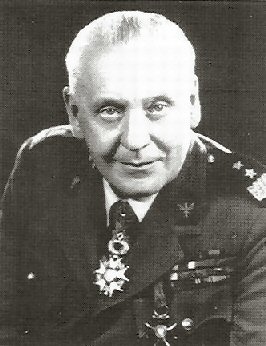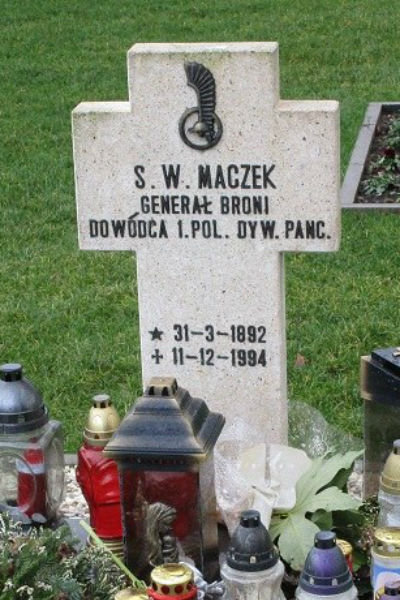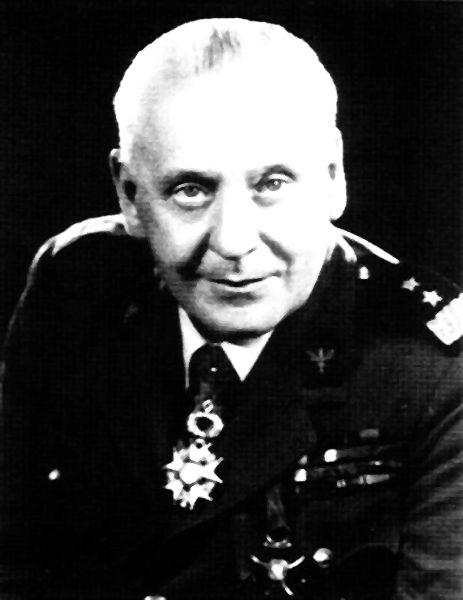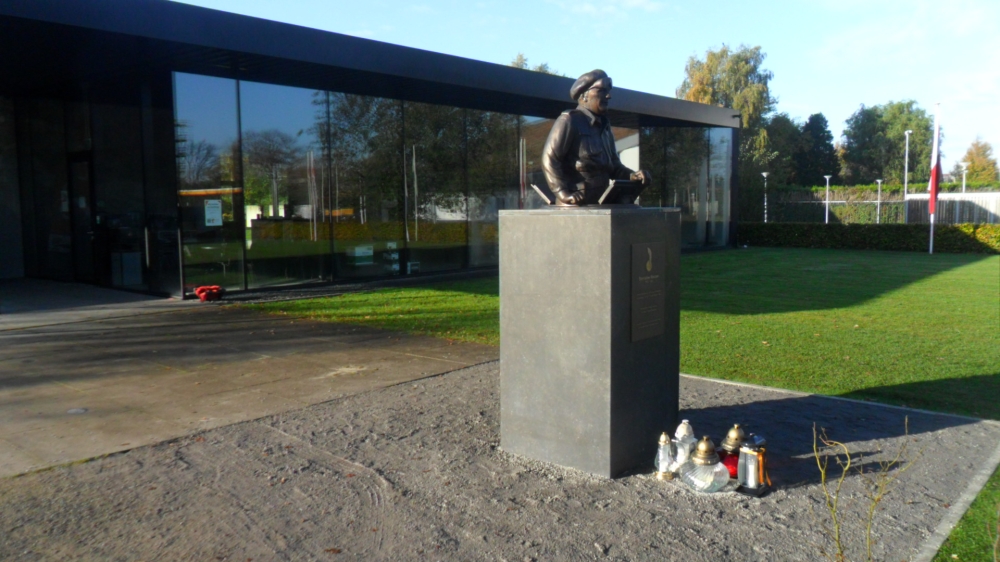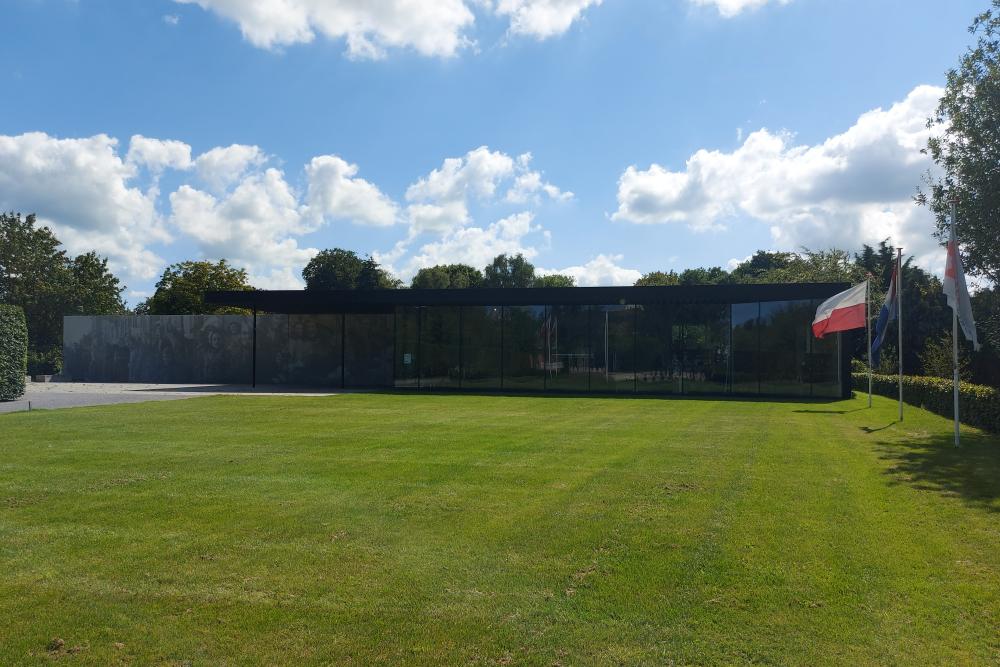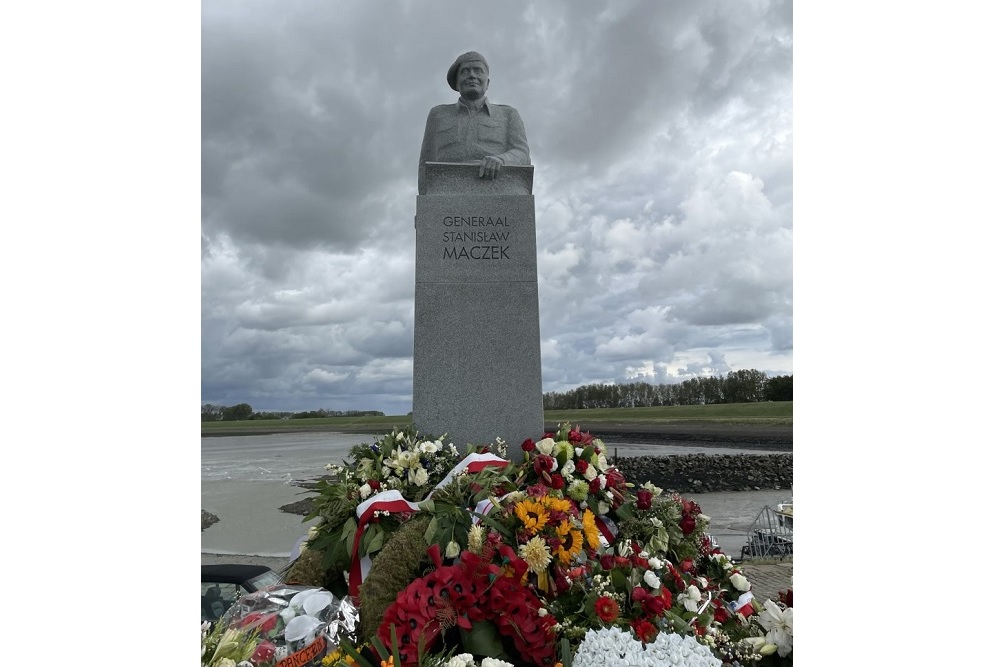Maczek, Stanislaw Wladyslaw "Baca"
- Date of birth:
- March 31st, 1892 (Szczerzec, Austro-Hungarian Empire)
- Date of death:
- December 11th, 1994 (Edinburgh, Scotland)
- Buried on:
- Polish War Cemetery Breda
- Nationality:
- Polish
Biography
Stanislaw Maczek was born in 1892 in Szczerzec near Lwow, Poland as part of a generation that strove for the resurrection of an independant Poland. Between 1910 and 1914. Stanislaw Maczek studied literature and philosophy at the University of Lwow. During World War I, being a subject of the Austrian-Hungarian Empire, Maczek served with distinction in the Imperial and Royal Army (Kaiserliche und Königliche Armee) on the Italian front in an elite mountain regiment.
In November 1918, following the collapse of Germany and the Austrian-Hungarian Empire, an independant Polish state was established whose borders were contested by her neighbours. Like so many Austrian-Hungarian officers of Polish origin, Maczek's military experience gained him access to the newly formed Polish army. It was an army that was to engage in a great conflict while still in a stae of development. During the Polish-Russian war of 1919-1921, Maczek held various posts, including service with the infantry, the cavalry and as a stafofficer. Among all these wartime employments however, the most interesting was a newly formed mobile unit, rather an early form of the later motorized military units.
After seven years of war, Maczek adapted to the dull life of a professional soldier in peacetime. At the end of the war, he had risen to Captain and was promoted to Major in 1922. The Polish army recognized Maczek's capabilities and in 1924, he was assigned to the Military Academy in Warsaw from where he would graduate. In 1927, he had risen to Lieutenant-colonel, in 1931 to Colonel and had been appointed commander of his own infantry regiment.
In October 1938, as dark clouds of a new war gathered, he was given command of a cavalry brigade, a prestigious appointment in the interwar years. It did not however prompt him to don cavalry boots or wear a sword since the 10th Cavalry Brigade (10 Brygada Kawalerii) was rather what is called today a transitional unit. In the 11 months prior to the outbreak of World War II, Maczek succeeded in transforming his unit to become the first Polish unit equiped for mechanized warfare.
In September 1939, the invasion of Poland by the Nazi's heralded the start of World War II. Due to the gross imbalance between the two armies, the campagne turned out to be a disaster for Poland. However, the achievements of the 10th Cavalry Brigade proved to be a positive exception. Under orders of Fieldmarshall Edward Smigly-Rydz, the brigade fought successfully and managed to slow down the advance of the superiour German forces. The brigade succeeded in crossing the Hungarian border and was subsequently interned.
Maczek managed to escape with many of his men. He moved to North-Africa and ultimately arrived in France where he reported to the commander of the Polish forces in exile, General Wladislaw Sikorski in Paris. As recognition of his services, General Sikorski promoted him to Brigadeer-general and sent him to the military base of Coetquidan in Brittanny where he was put in charge of the Polish units. February 1940, he took command of the Polish Light Motorized Division which was formed from the cadre of the 10th Cavalry Brigade. At the time of the Nazi invasion of France in May 1940, the division was still understrength and was unable to handle their new French equipment properly.
June 16th and 17th, the Polish 10th Motorized Cavalry Brigade fought a series of bloody skirmishes against the intruders and scored a number of important victories near Montbard and the Burgundy Canal. At last, due to shortages of fuel and ammunition, they were forced to stop the fighting. June 22nd, 1940, the French army capitulated and General Sikorski ordered his troops to disband and escape via unoccupied France to England to continue the war from there. Some 20.000 Polish soldiers escaped to Great-Britain, including Maczek and his senior officers of the Polish 1st Motorized Cavalry Brigade. In Great-Britain, the Polish 1st Armoured Division (Pierwsza Dywizja Pancerna) was established with the remnants of the units that had been fighting in France and in 1942, Maczek was appointed commander of the division. The unit was organized, equiped and trained according to British standards but after the unit was incorporated into the British Army, its military conduct, its traditions and above all, its experience of two previous campaigns were kept up.
August 1st, 1944, 52-year old Maczek came ashore in Normandy, along with his division consisting of some 16.000 men and 400 tanks. August 5th, his troops were assigned to the 2nd Canadian Army Corps, commanded by Lieutenant-general Guy Granville Simonds and tasked with crushing German resistance and reaching Falaise. The Polish and Canadians fought alongside each other during Operation Totalize (August 7th - 10th) and operation Tractable (August 14th - 16th). August 19th, 1944, after having received orders for a major advance in an attempt to close the Falaise pocket against the retreating German 7th Army, the Polish armoured division advanced too far ahead of the 1st Canadian Army. The next day they were cut off from the Canadian troops and variouis Polish units engaged the German army in fierce battles near Chambois and Hill 262 (Maczuga). Despite shortages of supplies and ammunition and suffering heavy casualties, they managed to hold out until August 21st, when they were finally relieved by Canadian forces.
After a few days of rest, Maczek and his men rejoined the Canadians and advanced further towards the river Seine, then the river Somme, the city of Antwerp and the Scheld estuary. September 28th, 1944, the 1st. Polish armoured division was placed under British command and reassigned to an area around the river Meuse. The city of Breda was to be captured October 29th, 1944, but it took heavy fighting near Baarle-Nassau and many Poles lost their lives. The city was liberated two days later, some 40 Polish soldiers had lost their lives and due General Maczek's cautious and tactical approach, the city was spared of widespread destruction. For this he was awarded the honorary citizenship of the city October 30th, 1944.
April 8th, 1945, the Polish 1st armoured division rejoined the Canadian 2nd Army Corps for the final push to the North Sea. Large areas of the provinces of eastern Drenthe and Groningen were liberated by the division and the drive continued towards northwestern Germany. The Poles reached the city of Wilhelmshafen, May 3rd, 1945, and Maczek met with representatives of the city to accept the capitulation of this large naval base.
Shortly after, Maczek was promoted to Lieutenant-general and given command of the Polish 1st Corps in Scotland. The end of World War II was not a happy one for Maczek and his Polish troops. They had been willing to sacrifice their lives for the liberation of their homeland but it seemed that although the Nazi's had been driven out, they had come under Sovjet rule.
Following his demobilization in 1947, Maczek decided to take up residence in the city of Edinburgh, the Scottish capital, along with his family. In 1961, he published his memoirs entitled: ''Od podwody do czolga" (From horsedrawn carriage to tank).
Stanislaw Wladyslaw Maczek died in Edinburgh, December 11th, 1994, at the age of 102 years. In accordance with his last wishes, he was buried near his men on the Polish Military Field of Honour on the Ettensebaan in the city of Breda.
Do you have more information about this person? Inform us!
- Period:
- First World War (1914-1918)
- Rank:
- Leutnant
- Unit:
- k.k. Landesschützen-Regiment „Bozen“ Nr. II, Tiroler Kaiserschützen, kaiserlich-königliche Landwehr
- Period:
- First World War (1914-1918)
- Rank:
- Leutnant
- Unit:
- k.k. Landesschützen-Regiment „Bozen“ Nr. II, Tiroler Kaiserschützen, kaiserlich-königliche Landwehr
- Period:
- First World War (1914-1918)
- Rank:
- Leutnant
- Unit:
- k.k. Landesschützen-Regiment „Bozen“ Nr. II, Tiroler Kaiserschützen, kaiserlich-königliche Landwehr
- Period:
- First World War (1914-1918)
- Rank:
- Leutnant
- Unit:
- k.k. Landesschützen-Regiment „Bozen“ Nr. II, Tiroler Kaiserschützen, kaiserlich-königliche Landwehr
- Period:
- First World War (1914-1918)
- Rank:
- Leutnant
- Unit:
- k.k. Landesschützen-Regiment „Bozen“ Nr. II, Tiroler Kaiserschützen, kaiserlich-königliche Landwehr
- Period:
- First World War (1914-1918)
- Rank:
- Leutnant
- Unit:
- k.k. Landesschützen-Regiment „Bozen“ Nr. II, Tiroler Kaiserschützen, kaiserlich-königliche Landwehr
- Period:
- Polish-Soviet War (1919-1921)
- Rank:
- Kapitan (Captain)
- Awarded on:
- 1920
- Period:
- Polish-Soviet War (1919-1921)
- Rank:
- Kapitan (Captain)
- Period:
- Second World War (1939-1945)
- Rank:
- General Brygadi (Brigadier)
- Unit:
- 10 Brygada Kawalerii, Armia "Kraków", Wojsko Polskie
- Awarded on:
- 1942
- Period:
- Second World War (1939-1945)
- Rank:
- General Brygadi (Brigadier)
- Unit:
- HQ, 1st Polish Armoured Division, Polish Armed Forces in the West
- Awarded on:
- November 25th, 1944
Awarded by field marshall Montgomery in Breda
- Period:
- Second World War (1939-1945)
- Rank:
- General Brygadi (Brigadier)
- Unit:
- HQ, 1st Polish Armoured Division, Polish Armed Forces in the West
- Awarded on:
- November 25th, 1944
Since it was first committed in this theatre this div has been engaged in the most varied types of combat.
Heavy demands have repeatedly been made upon it, and the courage, determination and endurance of its troops have been subjected to the most severe tests. Special mention must be made in this connection of the bitter and savage fighting at Falaise and of the pursuit, relatively swift but with its attendant military difficulties, from the Somme.
That this div has successfully met every call which has been made upon it and has established an excellent and enviable record in battle in attributable in large measure to the energy, skill and resources of Maj-Gen Maczek. His grasp and appreciation of the problems with which he has been confronted have consistently been quick and sound and he has shown marked ability speedily to formulate and carry out plans and to adapt the resources at his disposal to the changing requirements of any situation. By the force of his personality and his unending, concern for the welfare of his troops he has encouraged all those about him to quite extraordinary efforts.
The relentless determination, indefatigable industry and intrepid leadership of Maj-Gen Maczek have been outstanding and he has made a notable contribution to the success of the common cause.
Awarded by field marshall Montgomery in Breda
- Period:
- Second World War (1939-1945)
- Rank:
- General Brygadi (Brigadier)
- Unit:
- HQ, 1st Polish Armoured Division, Polish Armed Forces in the West
- Awarded on:
- March 26th, 1945
- Period:
- Second World War (1939-1945)
- Rank:
- General Brygadi (Brigadier)
- Unit:
- HQ, 1st Polish Armoured Division, Polish Armed Forces in the West
- Awarded on:
- March 26th, 1945
with palmes
- Period:
- Second World War (1939-1945)
- Rank:
- General Brygadi (Brigadier)
- Unit:
- HQ, 1st Polish Armoured Division, Polish Armed Forces in the West
- Awarded on:
- 1945
with palmes
- Period:
- Second World War (1939-1945)
- Rank:
- General Brygadi (Brigadier)
- Unit:
- HQ, 1st Polish Armoured Division, Polish Armed Forces in the West
- Awarded on:
- 1945
with palmes
- Period:
- Second World War (1939-1945)
- Rank:
- Major-General
- Unit:
- HQ, 1st Polish Armoured Division, Polish Armed Forces in the West
- Awarded on:
- April 3rd, 1946
- Period:
- Second World War (1939-1945)
- Rank:
- General Dywizji (Major General)
- Unit:
- HQ, 1st Polish Armoured Division, Polish Armed Forces in the West
- Awarded on:
- March 2nd, 1987
- Period:
- Second World War (1939-1945)
- Rank:
- General Broni (General)
- Awarded on:
- January 19th, 1995
Posthumously awarded
- Period:
- Second World War (1939-1945)
- Rank:
- General Broni (General)
- Awarded on:
- 1998
Posthumously awarded
- Period:
- Second World War (1939-1945)
- Period:
- Second World War (1939-1945)
- Period:
- Second World War (1939-1945)
- Rank:
- General Brygadi (Brigadier)
- Unit:
- HQ, 1st Polish Armoured Division, Polish Armed Forces in the West
- Period:
- Second World War (1939-1945)
- Rank:
- General Dywizji (Major General)
- Period:
- Second World War (1939-1945)
- Rank:
- General Brygadi (Brigadier)
- Unit:
- HQ, 1st Polish Armoured Division, Polish Armed Forces in the West
- Period:
- Second World War (1939-1945)
- Rank:
- General Dywizji (Major General)
- Period:
- Second World War (1939-1945)
- Rank:
- General Dywizji (Major General)
- Period:
- Second World War (1939-1945)
- Rank:
- General Dywizji (Major General)
- Unit:
- HQ, 1st Polish Armoured Division, Polish Armed Forces in the West
- Period:
- Second World War (1939-1945)
- Unit:
- HQ, 1st Polish Armoured Division, Polish Armed Forces in the West
- Period:
- Second World War (1939-1945)
- Period:
- Second World War (1939-1945)
Sources
- Photo 2: Dick de Bruijne
- Battle Zone Normandy, deel 14: Falaise Pocket. by Paul Latawski
Juno Beach Centre
Maczek Museum
Onderscheidingen.nl




































